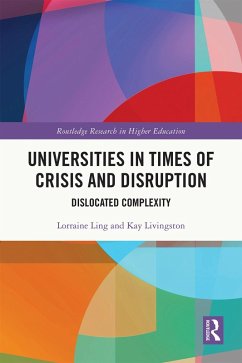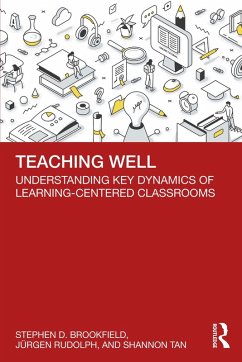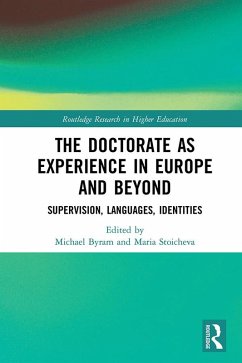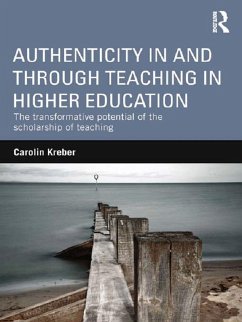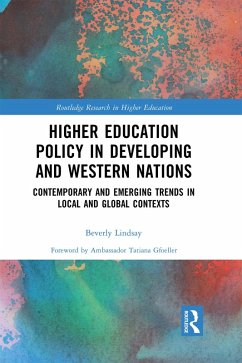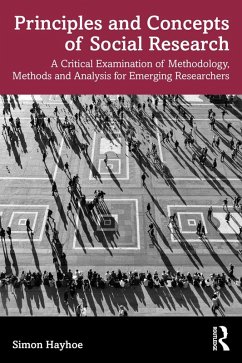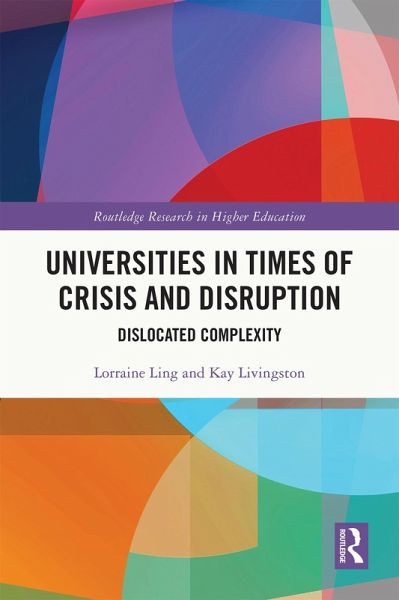
Universities in Times of Crisis and Disruption (eBook, PDF)
Dislocated Complexity
Versandkostenfrei!
Sofort per Download lieferbar
38,95 €
inkl. MwSt.
Weitere Ausgaben:

PAYBACK Punkte
19 °P sammeln!
This book examines the role and future of universities in times of chronic disruption and crisis - presented via an original conceptual framework which the authors term 'Dislocated Complexity' - and discusses how to move forward in the face of severely disrupted social, political, economic and environment contexts.Demonstrating how global crises, especially the COVID-19 pandemic, have dramatically dislocated and disrupted all contexts of society, the authors use this framework of Dislocated Complexity to propose a set of characteristics and values that underpin roles for universities, consider...
This book examines the role and future of universities in times of chronic disruption and crisis - presented via an original conceptual framework which the authors term 'Dislocated Complexity' - and discusses how to move forward in the face of severely disrupted social, political, economic and environment contexts.
Demonstrating how global crises, especially the COVID-19 pandemic, have dramatically dislocated and disrupted all contexts of society, the authors use this framework of Dislocated Complexity to propose a set of characteristics and values that underpin roles for universities, considering the future of universities with regards to teaching and learning, research, management and leadership, workforce change, policymaking and engagement. Novel, innovative concepts and theoretical perspectives are brought to the analysis of futures, roles and activities of universities by the authors, such as 'Unscripted Agency', 'Clashing -ologies', 'Emanant Trust' and 'Dislocated Complexity Leadership Theory'.
Ultimately calling for a rethink of university futures, this timely book will be of great interest to academics, researchers and post-graduate students in the fields of higher education research and teaching and learning. It will also be of interest to university managers, educational policy makers, and those who are 'hidden' or informal educators in the community.
Demonstrating how global crises, especially the COVID-19 pandemic, have dramatically dislocated and disrupted all contexts of society, the authors use this framework of Dislocated Complexity to propose a set of characteristics and values that underpin roles for universities, considering the future of universities with regards to teaching and learning, research, management and leadership, workforce change, policymaking and engagement. Novel, innovative concepts and theoretical perspectives are brought to the analysis of futures, roles and activities of universities by the authors, such as 'Unscripted Agency', 'Clashing -ologies', 'Emanant Trust' and 'Dislocated Complexity Leadership Theory'.
Ultimately calling for a rethink of university futures, this timely book will be of great interest to academics, researchers and post-graduate students in the fields of higher education research and teaching and learning. It will also be of interest to university managers, educational policy makers, and those who are 'hidden' or informal educators in the community.
Dieser Download kann aus rechtlichen Gründen nur mit Rechnungsadresse in A, B, BG, CY, CZ, D, DK, EW, E, FIN, F, GR, HR, H, IRL, I, LT, L, LR, M, NL, PL, P, R, S, SLO, SK ausgeliefert werden.




